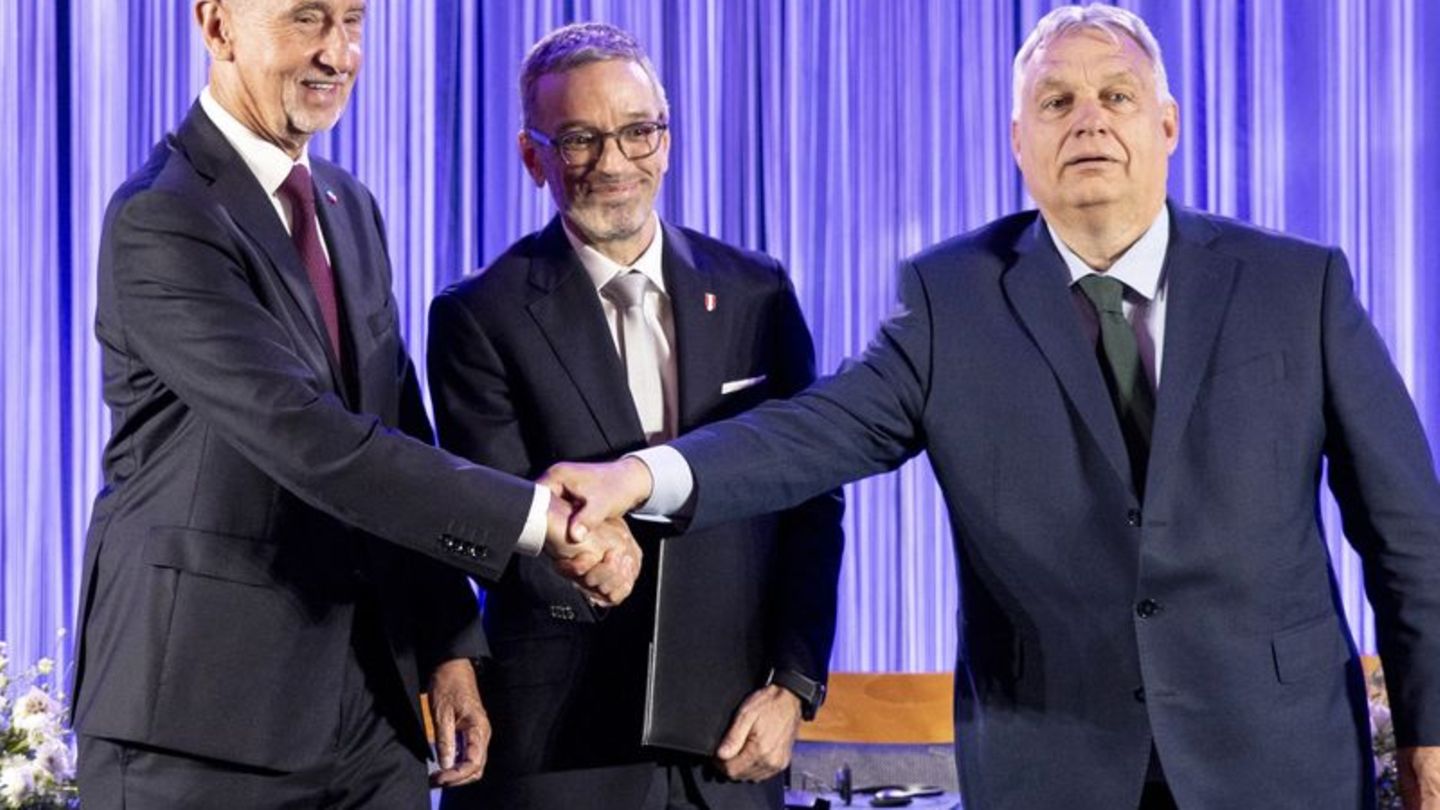The EU’s poltergeist is not letting up in the fight against the “Brussels elites”. Viktor Orban is gathering like-minded people around him to shake up the European Union. Is the AfD joining in?
One day before taking over the Presidency of the Council of the European Union (EU), Hungarian Prime Minister Viktor Orban announced the formation of a new far-right parliamentary group in Parliament.
The “Patriots for Europe” group includes the Hungarian government party Fidesz, the right-wing Austrian FPÖ and the liberal-populist Czech ANO, said Fidesz leader Orban in Vienna in the presence of FPÖ leader Herbert Kickl and ANO chairman Andrej Babis. The alliance is open to other parties that support the “Patriotic Manifesto” signed by the three party leaders.
Orban: “A new era begins”
With the hoped-for influx of “Patriots”, the group would become “the largest faction of right-wing forces in Europe”, said Orban. “A new era is beginning”, he continued. The new faction will change Europe “even against the will of the Brussels elites”. The “Patriotic Manifesto” contains the well-known positions of right-wing, right-wing populist and right-wing extremist parties: rejection of migration and the “Green Deal”, no support for Ukraine, which has been attacked by Russia, and dismantling of integration in the EU in order to strengthen the sovereignty of nation states.
“This alliance is intended to be a launch vehicle,” said FPÖ leader Kickl. ANO chairman and former Czech Prime Minister Andrej Babis explained that the new group in the European Parliament is primarily focused on defending national sovereignty against the EU, fighting illegal migration and reversing the climate measures of the “Green Deal”.
Own parliamentary group needs 23 members from 7 countries
The opposition party FPÖ, the opposition ANO and the right-wing populist Fidesz received the most votes in the EU elections in their respective countries. Fidesz has eleven representatives in the new European Parliament, ANO seven and the FPÖ six. In total they have 24 of the 705 representatives in the EU body. A minimum of 23 representatives from seven countries are required to form a parliamentary group.
Neither Orban nor Kickl nor Babis indicated which parties from which countries with seats in the European Parliament could join the new group. In terms of content, Fidesz and the FPÖ in particular have many points of contact with the AfD, which was excluded from the right-wing ID group shortly before the European elections on June 9.
Benevolent signals from the AfD hinterland
On the sidelines of the AfD federal party conference in Essen, AfD leader Tino Chrupalla declined to comment on Orban’s plans when asked. At the opening match of the European Football Championship in Munich, he took a selfie with Orban in the stadium and shared it on his Instagram channel.
AfD MEP Marc Jongen, on the other hand, expressed himself favorably on Deutschlandfunk. “If it were up to me, we would also be very happy to join this group,” he said. His party could “sign the Patriotic Manifesto immediately.” In terms of content, they are “very close to Orban,” and they are working on “establishing formal cooperation in the future.”
Article 7 proceedings against Hungary
Hungary will take over the six-month rotating presidency of the EU on Monday. Orban, who has ruled the country for 14 years, is controversial in the EU. According to critics, under the pretext of “sovereign government action”, he has dismantled the rule of law and democracy in Hungary and thereby violated the spirit and letter of the European Treaties, the EU’s basic documents. This also includes bringing key segments of the economy – including banks and the telecom sector – under the control of oligarchs close to him.
A so-called Article 7 procedure is underway against Hungary due to various serious violations, which could result in the withdrawal of voting rights in the EU. The EU is also withholding several billion euros in subsidies to which Hungary would be entitled, but whose payment is suspended due to the EU’s rule of law mechanism. As head of government of the presiding country, however, Orban cannot intervene in these processes. He has a certain amount of leeway in setting topics and steering debates in the EU’s top bodies.
Fidesz promotes conspiracy narrative
The group of MPs from Orban’s Fidesz party was in turn isolated in the European Parliament after being pushed out of the conservative European People’s Party (EPP) group, which also includes the CDU and CSU, in 2021 after years of disputes. Orban’s attempt after the European elections to accommodate his Fidesz MPs in the right-wing European Conservatives and Reformists (ECR) group failed due to the negative attitude of Italian Prime Minister Giorgia Meloni. The dominant forces in the ECR, Meloni’s Fratelli d’Italia and the Polish PiS, consider Orban’s closeness to Russia unacceptable.
Orban and Fidesz openly represent positions from the extreme right of the European party spectrum, including the conspiracy narrative of “population exchange”: “Global elites”, among them the Hungarian-born US billionaire and philanthropist George Soros, are doing everything they can to promote the immigration of Muslims to Europe in order to rob the European peoples of their “Christian and national identity”, they claim. There is no evidence for this.
Source: Stern
I have been working in the news industry for over 6 years, first as a reporter and now as an editor. I have covered politics extensively, and my work has appeared in major newspapers and online news outlets around the world. In addition to my writing, I also contribute regularly to 24 Hours World.




